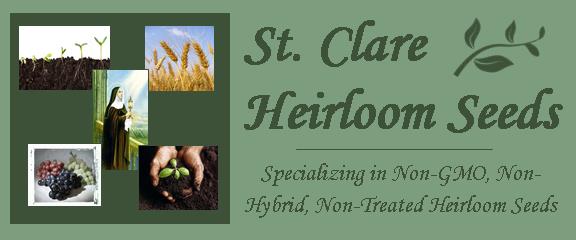The heirloom vegetable gardener can buy seed from a reputable Open Pollinated / Heirloom seedsman or use there own home grown supplies from there own Heirloom Open Pollinated Seeds kept from the year before. Very fine varieties that do extremely well in certain areas have been grown for long periods from locally produced Open Pollinated / Heirloom seed, and such practices are to be commended, provided adequate measures are taken to keep the strains pure.Open Pollinated / Heirloom Garden Vegetables that are entirely, or readily, cross pollinated among plants of their kind include Open Pollinated / Heirloom corn, cucumbers, melons, squash, pumpkins, cress, mustard, Brussels sprouts, cabbage, cauliflower, collards, kale, kohlrabi, spinach, onion, radish, beet, and turnip. Those less readily cross-pollinated are Open Pollinated / Heirloom eggplant, pepper, tomato, carrot, and celery. Open Pollinated / Heirloom Beans, peas, okra, and lettuce are generally self-pollinated, but occasionally cross-pollinated, lima beans sometimes rather extensively. Because Open Pollinated / Heirloom sweet corn will cross with field corn, it is unwise to save sweet corn seed if field corn is growing in the same neighborhood. Hybrid sweet corn should not be saved for seed. The custom of saving seed from a choice Open Pollinated / Heirloom watermelon is safe, provided no citrons or other varieties of watermelons are growing nearby. Likewise, seed from a Open Pollinated / Heirloom muskmelon is safe, even though it was grown side by side with cucumbers. Open Pollinated / Heirloom Beans do not readily cross and their seed also may be saved. Open Pollinated / Heirloom Cabbage, kohlrabi, kale, collard’s, broccoli, and cauliflower all intercross freely, so each must be well isolated from the others if seed is to be saved.
Open Pollinated / Heirloom Garden seeds should be ordered well in advance of planting time, but only after the preparation of a garden plan that shows the size of the plantings and the quantity of seed required. Crops and varieties that are known to be adapted to the locality should be selected. The agricultural experiment station of each State, local Extension agents, and experienced Open Pollinated / Heirloom gardeners are usually able to give advice about varieties of vegetables that are adapted to the area. Standard sorts of known quality and performance are usually the best choice.
Disease resistant strains and varieties of many important vegetables are now so generally available that there is little reason for risking the loss of a crop through planting susceptible sorts. This phase of the subject is treated in detail under the individual crops.
Some Open Pollinated / Heirloom seeds retain their vitality longer than others. Seeds may be divided into three groups as follows: (1) Comparatively short lived, usually not good after 1 to 2 years Open Pollinated / Heirloom corn, leek, onion, parsley, parsnip, rhubarb and salsify; (2) moderately long lived, often good for 3 to 5 years Open Pollinated / Heirloom asparagus, beans, Brussels sprouts, cabbage, carrot, cauliflower, celery, kale, lettuce, okra, peas, pepper, radish, spinach, turnip and watermelon; and (3) long lived, may be good for more than 5 years Open Pollinated / Heirloom beet, cucumber, eggplant, muskmelon, and tomato.

